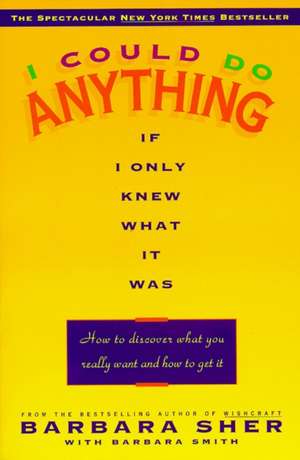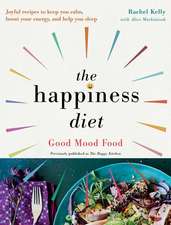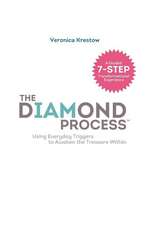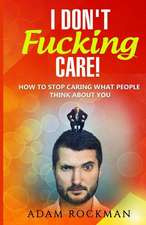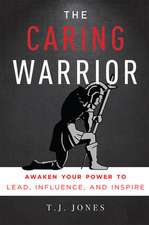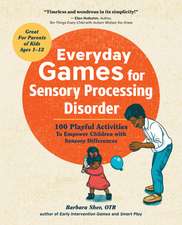I Could Do Anything If I Only Knew What It Was: How to Discover What You Really Want and How to Get It
Autor Barbara Sher Barbara Smithen Limba Engleză Paperback – 31 iul 1995
A life without direction is a life without passion. The dynamic follow-up to the phenomenal best-seller Wishcraft, I Could Do Anything If I Only Knew What It Was (the New York Times Bestseller) guides you, not to another unsatisfying job, but to a richly rewarding career rooted in your heart's desire. And in a work of true emancipation, this life-changing sourcebook reveals how you can recapture "long lost" goals, overcome the blocks that inhibit your success, decide what you want to be, and live your dreams forever!
You will learn:
* What to do if you never chose to be what you are.
* How to get off the fast track--and on to the right track.
* First aid techniques for paralyzing chronic negativity.
* How to regroup when you've lost your big dream.
* To stop waiting for luck--and start creating it.
Preț: 95.37 lei
Nou
Puncte Express: 143
Preț estimativ în valută:
18.25€ • 18.81$ • 15.41£
18.25€ • 18.81$ • 15.41£
Carte disponibilă
Livrare economică 10-24 februarie
Livrare express 24-30 ianuarie pentru 23.89 lei
Preluare comenzi: 021 569.72.76
Specificații
ISBN-13: 9780440505006
ISBN-10: 0440505003
Pagini: 336
Dimensiuni: 156 x 235 x 19 mm
Greutate: 0.34 kg
Editura: Dell Publishing Company
ISBN-10: 0440505003
Pagini: 336
Dimensiuni: 156 x 235 x 19 mm
Greutate: 0.34 kg
Editura: Dell Publishing Company
Extras
This book is designed to help you find the good life. By that, I don't mean swimming pools, mansions, and private jets -- unless those are really your big passions. But if you picked up a book called I Could Do Anything If I Only Knew What It Was, you're probably looking for a lot more than a swimming pool.
You want a life you will love.
A friend's father got it right when he said "The good life is when you get up in the morning and can't wait to start all over again."
Is that you? Or does his idea of the good life sound like an unreachable paradise? If you aren't the kind of person who jumps out of bed every morning excited about the day ahead, I know you desperately long to find a goal that will make you feel like my friend's father. You crave work that will spark excitement and energy; you yearn to find the place where you can make your mark. Albert Schweitzer found his place, so did Golda Meir, and so did the kid next door who practiced guitar day and night. They knew how to live. They believed in what they were doing with all their hearts. They knew their work was important. When you get near people who are pursuing their heart's desire, you can see the intensity on their faces.
Life is just too short to live without that kind of focus.
In the early 1980s, two Harvard psychologists completed a study of people who called themselves happy. And what did happy people have in common? Money? Success? Health? Love?
None of these things.
They had only two things in common: They knew exactly what they wanted and they felt they were moving toward getting it.
That's what makes life feel good: when it has direction, when you are headed straight for what you love.
And I mean love.
I don't mean what you're skilled at. I don't really care what your skills are. When I was a single working mother with two babies, you know what my skills were? I could clean house like a demon; catch a moving bus with my arms full of laundry, groceries, and kids; and squeeze a dollar until the picture of George Washington screamed for mercy.
I do not want the career that uses those skills, thank you.
I don't believe you live the good life by doing what you can do; you live it by doing what you want to do. I don't even think your greatest talents necessarily show up in your skills. All of us are good at things we're not madly in love with. And all of us have talents we've never used.
Relying on your skills to guide you is simply unacceptable. That's why I don't intend to give you personality tests or skills assessments to find out what you should be doing.
I know what you should be doing.
You should be doing what you love.
What you love is what you are gifted at. Only love will give you the drive to stick to something until you develop your gift. That's the way really big things get accomplished in this world -- by people no different than you and I who know what they want and put everything they've got behind it.
If you don't know what you want, you can't get out of the starting gate -- and that's discouraging. But you're not alone. Recent figures show that as many as 98 percent of Americans are unhappy in their jobs. And it isn't only financial considerations that keep them where they are; they simply don't know what to do instead. What you may have thought was your private little nightmare turns out to be heartbreakingly common.
Well, I have a surprise for you.
You do know what you want.
Everybody does. That's why you feel so restless when you can't find the right track. You sense there's some particular work you are meant to be doing. And you're right. Einstein needed to formulate theories of physics, Harriet Tubman needed to guide people to freedom, and you need to follow your original vision. As Vartan Gregorian said, "The universe is not going to see someone like you again in the entire history of creation." Each of us is one of a kind. Every living person has a completely original way of looking at the world, and originality always needs to express itself.
But many of us get stopped. Every time we resolve to change our lives, every time we go to pick up the baton and get into the race, something happens. For some mysterious reason our determination melts. We look at the baton and think "This race isn't it." And we put down the baton, uneasy because time is slipping away, frightened that we'll never find "it."
There are two reasons for this.
One reason it's so hard to know what we want is that we have so many options. This wasn't always true. Our parents and their parents had fewer choices and clearer goals. It's a tribute to the success of our culture that so many of us have the freedom to search for our own life's work.
Freedom is glorious. But freedom also torments us because it requires us to create our own goals.
Did you know that fewer people get depressed during war than in peacetime? In a war, everything is important. Day to day, you know exactly what to do. Your life may be frightening, but the struggle to survive gives you direction and drive. You don't waste any time trying to figure out what you're worth or what you're supposed to do with your life. You just try to keep alive, save your home, help your neighbors. The reason we love to watch films about people whose lives are in danger is because every move is loaded with meaning.
When there's no emergency to rise to, we have to create goals that have meaning. You can create such goals if you know what your dream is -- but this is a relatively new way of living. The old way to live was to let necessity create your goal; the new way is to use your dream to create your goal. We have had very little practice at this new way.
The second reason you don't know what you want is that something inside you is stopping you from knowing. Your dreams are obscured by some kind of internal conflict. It's not as easy as you might think to spot inner conflicts. Often they're disguised as self-reproach. "Maybe I have no talent," "Maybe I'm just lazy," "If I were smarter I'd have done more with my life."
If there's one thing I want you to get out of reading this book it's to know that not one of those statements is true.
The first goal of this book is to shine a spotlight on your particular inner conflict so you can see it clearly outlined. As soon as you see what's been in your way, you'll know exactly why you haven't created the life you wanted. You'll quit reproaching yourself. You'll understand that you've been unable to get moving for a reason.
Our culture is full of simpleminded myths of blame, such as "If you really wanted something badly enough, you'd go out and get it," and "If you're sabotaging yourself, you lack character." Nobody ever asks the obvious question: "Why would anybody want to do himself harm by sabotaging himself?" It takes curiosity to find the answer to that question, and judgmental people always lack curiosity.
In the following chapters we're going to stop all this blaming and swap it for honest, nonjudgmental curiosity. I have the deepest respect for sincere curiosity -- and very little respect for self-righteousness. The useful answers, the answers that help us solve problems, are always the more forgiving ones. They're based on a line of inquiry that assumes there is always a good reason for everything. There is certainly a good reason you lost direction, and this book is going to help you find it.
Until then, just remember, whatever you were doing until you picked up this book, you were not being lazy or stupid or cowardly. Even self-improvement programs, no matter how helpful, are often judgmental. They are often based on the assumption that you don't have what you want because you haven't developed the right way of thinking. They assume you've got to get fixed before you can get what you want.
Well, forget that.
You don't have to become a better person or develop a different attitude to have a life you love. As you are, you are good enough. In fact, the smartest thing you can do is to go ahead and get what you want before you do anything to improve yourself. Getting your life on track will do wonders for your "bad" attitude.
I have no intention of suckering you into some program that tells you to stand up straight and be a different person. Life just isn't that simple, and wishful thinking won't make it so. I don't think people solve problems with positive thinking either. Propping up your thoughts, pretending to feel different than you really do, is not a sturdy enough system for the long haul. Creative visualization has its limitations too. I've met a lot of people who can't visualize, and others who feel strongly conflicted even imagining what they love. And "create your own reality" sounds empowering, but its flip side is that you can end up blaming yourself for everything that goes wrong. That's not fair. You're not big enough to take on fate single-handedly, and you don't need to.
What you do need is to understand why you don't know what you want. Once you begin to understand the perfectly good explanation for your confusion, you will finally be able to do something about it.
The second goal of this book is to show you how to do something about it. I've put tools and strategies in each chapter to help you extricate yourself from your internal conflicts every time you need to--now and in the future.
The first three chapters of this book are for every reader. They're the chapters that shine a light on your conflict and illuminate its contours for you. Once you see the general shape of your problem, you'll be able to flip to a chapter in the book that will give you strategies for doingwhatever you've got to do to get past your particular kind of conflict.
It's not hard to learn what your inner conflict is about, because once you learn to listen for it, you'll notice inner conflicts make a lot of racket. One side of the conflict is arguing in favor of your getting what you want, and the other side is determined to stop you. All you have to do is listen carefully to the louder voice: It will lead you straight to the strategies that can help you.
Does your voice say something like "I'd have to quit my job to get what I really want and I can't do that -- I'd starve"? If so, you'll want to read Chapter 4, "The Sure Thing," where you'll learn about the great risk you take when you avoid adventure.
Does your voice say "Every time I try to go after what I want, I drop the ball and I don't know why"? Then try Chapter 5, "Fear of Success: Leaving the Ones You Love Behind."
If your voice says "I want to do so many things, I'll never be able to pick only one,"Chapter 6 will show you how to have it all. (It will also show you how to focus on just one thing, if that's what you secretly wish you could do.)
Now, what if you're doing wonderfully in other people's eyes, you've got a skyrocketing career on your hands, but you're not happy? Is your voice saying "How can I walk away from success? And what will I live on if I do"? Take a new look at your options. Turn to Chapter 7, "On the Wrong Track, and Moving Fast."
When you think you know what you want, but your voice says "I want something I shouldn't want -- it's trivial or unworthy," that's Chapter 8. You might have a "tribal problem" with your family, friends, or culture: you want something that puts you in conflict with everything you were taught.
If you've just finished high school or college or a training program and your voice says "I'm afraid to choose something. I might get trapped!" then pick up Chapter 9, "Help! I'm Not Ready to Be Born Yet." It'll show you how to avoid being trapped and start living.
Chapter 10, "Regrouping: It's a Whole New Ball Game," will help if you've just been through a big change -- if you've just retired or if the kids have just grown up and left home -- in which case you probably hear a voice saying, "I don't have Idea One what to do now."
If your voice says "What's the point? I'll only be disappointed. Nothing will ever match what I already had and lost," turn to Chapter 11, "I've Lost My Big Dream -- There's Nothing Left." You'll discover that life is still worth living.
If you hear your voice saying "I've tried so many things and nothing does it for me," then look at Chapter 12, "Nothing Ever Interests Me." You've probably got a case of disabled desire.
If your voice says "It's not my fault I'm not doing what I want -- the world won't give me a break!" you need to look at Chapter 13, "A Rage Against the Ordinary." And if you hear a voice saying "I'm trying to go after something, but my heart's not really in it, and I don't know why," your situation is not as big a mystery as you may think. Look at Chapter 14, "The Red Herring, or Trying Hard to Love Something You Don't Really Want." You might discover you really want something you're trying to give up.
If you can't hear any voice from your conflict now, don't let it worry you. You'll hear it by the end of Chapter 3. I guarantee it.
CAREERS IN THE NINETIES Once you begin to find your own path, you will have positioned yourself at the forefront of a massive historical change. In late twentieth-century industrial society, just about everybody -- like it or not -- is going to have to figure out what kind of work and life he really wants. Sooner or later everybody across every age group is going to have to ask "What do I want to do?"
The days are over when students took the path of least resistance to a banking career, say, or to law school and considered that one choice the end of their career planning. Last year's college graduates, according to one research firm, can expect to hold ten to twelve jobs in three to five different fields during their working lifetime. Like it or not, everybody's getting a second work life. Probably, a third life. Perhaps even more.
Corporations are continuing to downsize, and not only because of recent recessions: We're entering a new period in economic history. Global competition is forcing companies to make themselves lean and mean. Corporations are becoming about a third the size they once were, and they'll probably never get big again. Middle management is gone. Secretaries are being replaced by technology. The top twenty students from every college or business school may still get good job offers, but everyone else is on their own.
The wave of the future is clear: We're going to be a nation of experts -- consultants and entrepreneurs -- many of us working at home, all of us hired on a job-by-job basis according to our special talents.
And who's going to come shining through these cultural changes? Everyone who is
willing to develop what he loves into a niche for himself -- a niche where he can excel. Never have we needed to locate our own gifts more.
So let's get going. Let's see why you don't know what you want. And then, let's
do something about it.
You want a life you will love.
A friend's father got it right when he said "The good life is when you get up in the morning and can't wait to start all over again."
Is that you? Or does his idea of the good life sound like an unreachable paradise? If you aren't the kind of person who jumps out of bed every morning excited about the day ahead, I know you desperately long to find a goal that will make you feel like my friend's father. You crave work that will spark excitement and energy; you yearn to find the place where you can make your mark. Albert Schweitzer found his place, so did Golda Meir, and so did the kid next door who practiced guitar day and night. They knew how to live. They believed in what they were doing with all their hearts. They knew their work was important. When you get near people who are pursuing their heart's desire, you can see the intensity on their faces.
Life is just too short to live without that kind of focus.
In the early 1980s, two Harvard psychologists completed a study of people who called themselves happy. And what did happy people have in common? Money? Success? Health? Love?
None of these things.
They had only two things in common: They knew exactly what they wanted and they felt they were moving toward getting it.
That's what makes life feel good: when it has direction, when you are headed straight for what you love.
And I mean love.
I don't mean what you're skilled at. I don't really care what your skills are. When I was a single working mother with two babies, you know what my skills were? I could clean house like a demon; catch a moving bus with my arms full of laundry, groceries, and kids; and squeeze a dollar until the picture of George Washington screamed for mercy.
I do not want the career that uses those skills, thank you.
I don't believe you live the good life by doing what you can do; you live it by doing what you want to do. I don't even think your greatest talents necessarily show up in your skills. All of us are good at things we're not madly in love with. And all of us have talents we've never used.
Relying on your skills to guide you is simply unacceptable. That's why I don't intend to give you personality tests or skills assessments to find out what you should be doing.
I know what you should be doing.
You should be doing what you love.
What you love is what you are gifted at. Only love will give you the drive to stick to something until you develop your gift. That's the way really big things get accomplished in this world -- by people no different than you and I who know what they want and put everything they've got behind it.
If you don't know what you want, you can't get out of the starting gate -- and that's discouraging. But you're not alone. Recent figures show that as many as 98 percent of Americans are unhappy in their jobs. And it isn't only financial considerations that keep them where they are; they simply don't know what to do instead. What you may have thought was your private little nightmare turns out to be heartbreakingly common.
Well, I have a surprise for you.
You do know what you want.
Everybody does. That's why you feel so restless when you can't find the right track. You sense there's some particular work you are meant to be doing. And you're right. Einstein needed to formulate theories of physics, Harriet Tubman needed to guide people to freedom, and you need to follow your original vision. As Vartan Gregorian said, "The universe is not going to see someone like you again in the entire history of creation." Each of us is one of a kind. Every living person has a completely original way of looking at the world, and originality always needs to express itself.
But many of us get stopped. Every time we resolve to change our lives, every time we go to pick up the baton and get into the race, something happens. For some mysterious reason our determination melts. We look at the baton and think "This race isn't it." And we put down the baton, uneasy because time is slipping away, frightened that we'll never find "it."
There are two reasons for this.
One reason it's so hard to know what we want is that we have so many options. This wasn't always true. Our parents and their parents had fewer choices and clearer goals. It's a tribute to the success of our culture that so many of us have the freedom to search for our own life's work.
Freedom is glorious. But freedom also torments us because it requires us to create our own goals.
Did you know that fewer people get depressed during war than in peacetime? In a war, everything is important. Day to day, you know exactly what to do. Your life may be frightening, but the struggle to survive gives you direction and drive. You don't waste any time trying to figure out what you're worth or what you're supposed to do with your life. You just try to keep alive, save your home, help your neighbors. The reason we love to watch films about people whose lives are in danger is because every move is loaded with meaning.
When there's no emergency to rise to, we have to create goals that have meaning. You can create such goals if you know what your dream is -- but this is a relatively new way of living. The old way to live was to let necessity create your goal; the new way is to use your dream to create your goal. We have had very little practice at this new way.
The second reason you don't know what you want is that something inside you is stopping you from knowing. Your dreams are obscured by some kind of internal conflict. It's not as easy as you might think to spot inner conflicts. Often they're disguised as self-reproach. "Maybe I have no talent," "Maybe I'm just lazy," "If I were smarter I'd have done more with my life."
If there's one thing I want you to get out of reading this book it's to know that not one of those statements is true.
The first goal of this book is to shine a spotlight on your particular inner conflict so you can see it clearly outlined. As soon as you see what's been in your way, you'll know exactly why you haven't created the life you wanted. You'll quit reproaching yourself. You'll understand that you've been unable to get moving for a reason.
Our culture is full of simpleminded myths of blame, such as "If you really wanted something badly enough, you'd go out and get it," and "If you're sabotaging yourself, you lack character." Nobody ever asks the obvious question: "Why would anybody want to do himself harm by sabotaging himself?" It takes curiosity to find the answer to that question, and judgmental people always lack curiosity.
In the following chapters we're going to stop all this blaming and swap it for honest, nonjudgmental curiosity. I have the deepest respect for sincere curiosity -- and very little respect for self-righteousness. The useful answers, the answers that help us solve problems, are always the more forgiving ones. They're based on a line of inquiry that assumes there is always a good reason for everything. There is certainly a good reason you lost direction, and this book is going to help you find it.
Until then, just remember, whatever you were doing until you picked up this book, you were not being lazy or stupid or cowardly. Even self-improvement programs, no matter how helpful, are often judgmental. They are often based on the assumption that you don't have what you want because you haven't developed the right way of thinking. They assume you've got to get fixed before you can get what you want.
Well, forget that.
You don't have to become a better person or develop a different attitude to have a life you love. As you are, you are good enough. In fact, the smartest thing you can do is to go ahead and get what you want before you do anything to improve yourself. Getting your life on track will do wonders for your "bad" attitude.
I have no intention of suckering you into some program that tells you to stand up straight and be a different person. Life just isn't that simple, and wishful thinking won't make it so. I don't think people solve problems with positive thinking either. Propping up your thoughts, pretending to feel different than you really do, is not a sturdy enough system for the long haul. Creative visualization has its limitations too. I've met a lot of people who can't visualize, and others who feel strongly conflicted even imagining what they love. And "create your own reality" sounds empowering, but its flip side is that you can end up blaming yourself for everything that goes wrong. That's not fair. You're not big enough to take on fate single-handedly, and you don't need to.
What you do need is to understand why you don't know what you want. Once you begin to understand the perfectly good explanation for your confusion, you will finally be able to do something about it.
The second goal of this book is to show you how to do something about it. I've put tools and strategies in each chapter to help you extricate yourself from your internal conflicts every time you need to--now and in the future.
The first three chapters of this book are for every reader. They're the chapters that shine a light on your conflict and illuminate its contours for you. Once you see the general shape of your problem, you'll be able to flip to a chapter in the book that will give you strategies for doingwhatever you've got to do to get past your particular kind of conflict.
It's not hard to learn what your inner conflict is about, because once you learn to listen for it, you'll notice inner conflicts make a lot of racket. One side of the conflict is arguing in favor of your getting what you want, and the other side is determined to stop you. All you have to do is listen carefully to the louder voice: It will lead you straight to the strategies that can help you.
Does your voice say something like "I'd have to quit my job to get what I really want and I can't do that -- I'd starve"? If so, you'll want to read Chapter 4, "The Sure Thing," where you'll learn about the great risk you take when you avoid adventure.
Does your voice say "Every time I try to go after what I want, I drop the ball and I don't know why"? Then try Chapter 5, "Fear of Success: Leaving the Ones You Love Behind."
If your voice says "I want to do so many things, I'll never be able to pick only one,"Chapter 6 will show you how to have it all. (It will also show you how to focus on just one thing, if that's what you secretly wish you could do.)
Now, what if you're doing wonderfully in other people's eyes, you've got a skyrocketing career on your hands, but you're not happy? Is your voice saying "How can I walk away from success? And what will I live on if I do"? Take a new look at your options. Turn to Chapter 7, "On the Wrong Track, and Moving Fast."
When you think you know what you want, but your voice says "I want something I shouldn't want -- it's trivial or unworthy," that's Chapter 8. You might have a "tribal problem" with your family, friends, or culture: you want something that puts you in conflict with everything you were taught.
If you've just finished high school or college or a training program and your voice says "I'm afraid to choose something. I might get trapped!" then pick up Chapter 9, "Help! I'm Not Ready to Be Born Yet." It'll show you how to avoid being trapped and start living.
Chapter 10, "Regrouping: It's a Whole New Ball Game," will help if you've just been through a big change -- if you've just retired or if the kids have just grown up and left home -- in which case you probably hear a voice saying, "I don't have Idea One what to do now."
If your voice says "What's the point? I'll only be disappointed. Nothing will ever match what I already had and lost," turn to Chapter 11, "I've Lost My Big Dream -- There's Nothing Left." You'll discover that life is still worth living.
If you hear your voice saying "I've tried so many things and nothing does it for me," then look at Chapter 12, "Nothing Ever Interests Me." You've probably got a case of disabled desire.
If your voice says "It's not my fault I'm not doing what I want -- the world won't give me a break!" you need to look at Chapter 13, "A Rage Against the Ordinary." And if you hear a voice saying "I'm trying to go after something, but my heart's not really in it, and I don't know why," your situation is not as big a mystery as you may think. Look at Chapter 14, "The Red Herring, or Trying Hard to Love Something You Don't Really Want." You might discover you really want something you're trying to give up.
If you can't hear any voice from your conflict now, don't let it worry you. You'll hear it by the end of Chapter 3. I guarantee it.
CAREERS IN THE NINETIES Once you begin to find your own path, you will have positioned yourself at the forefront of a massive historical change. In late twentieth-century industrial society, just about everybody -- like it or not -- is going to have to figure out what kind of work and life he really wants. Sooner or later everybody across every age group is going to have to ask "What do I want to do?"
The days are over when students took the path of least resistance to a banking career, say, or to law school and considered that one choice the end of their career planning. Last year's college graduates, according to one research firm, can expect to hold ten to twelve jobs in three to five different fields during their working lifetime. Like it or not, everybody's getting a second work life. Probably, a third life. Perhaps even more.
Corporations are continuing to downsize, and not only because of recent recessions: We're entering a new period in economic history. Global competition is forcing companies to make themselves lean and mean. Corporations are becoming about a third the size they once were, and they'll probably never get big again. Middle management is gone. Secretaries are being replaced by technology. The top twenty students from every college or business school may still get good job offers, but everyone else is on their own.
The wave of the future is clear: We're going to be a nation of experts -- consultants and entrepreneurs -- many of us working at home, all of us hired on a job-by-job basis according to our special talents.
And who's going to come shining through these cultural changes? Everyone who is
willing to develop what he loves into a niche for himself -- a niche where he can excel. Never have we needed to locate our own gifts more.
So let's get going. Let's see why you don't know what you want. And then, let's
do something about it.
Recenzii
"For those who want to find their passion...a step-by-step guide for restructuring one's life so that it has meaning, direction and joy."
--Ellen Kreidman, author of Light His Fire and Light Her Fire
"Refreshingly witty and wise...Full of genuine and useful insight for achieving what you want from a career."
--Wess Roberts, Ph.D., author of Leadership Secrets of Attila the Hun
--Ellen Kreidman, author of Light His Fire and Light Her Fire
"Refreshingly witty and wise...Full of genuine and useful insight for achieving what you want from a career."
--Wess Roberts, Ph.D., author of Leadership Secrets of Attila the Hun
Descriere
With 175,000 hardcover copies in print, this spectacular New York Times bestseller has helped hundreds of thousands of people find and do what they love. Through simple exercises and sound advice, this empowering, life-changing book by the author of the hugely successful Wishcraft guides readers toward their true heart's desire and helps to uncover damaging inhibitions and fears.
Notă biografică
Barbara Sher with Barbara Smith
